FROM April 17th, 2019
Wellbeing Foundation Africa joins National Consultation on Women, Peace and Security in Abuja
This week the Wellbeing Foundation Africa joined the British High Commission in Abuja, Gender Action for Peace and Security in the UK, Women For Women International, Women Rights Advancement and Protection Alternative (WRAPA) and other civil society experts at the National Consultation on International Commitments and Priorities for action on the 20th Anniversary of UN Security Council Resolution 1325 in 2020.
The aim of the consultation was to reflect on women, peace, and security in Nigeria and to develop clear recommendations for the UK Government and the wider international community for action.
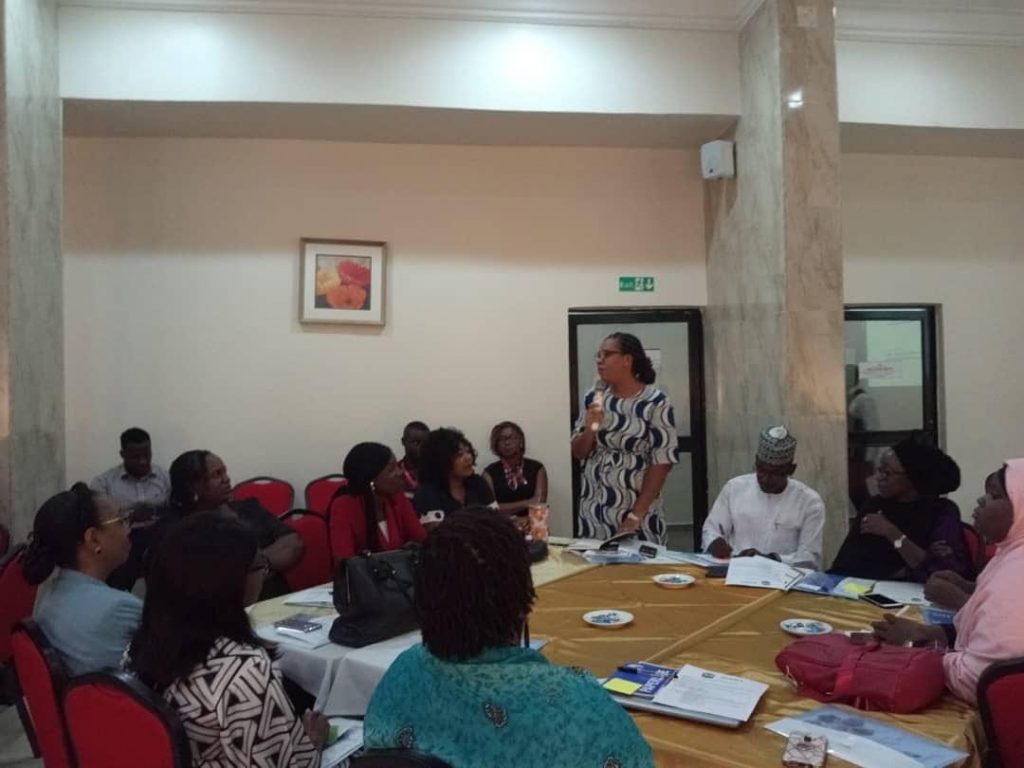
Toyin Ojora Saraki, Founder-President of the Wellbeing Foundation Africa, commented following the consultation meeting:
“I am pleased the Wellbeing Foundation Africa can bring its experience to bear on global policy for women, peace and security. Reflecting on the plight of the still-missing Chibok school girls, Leah Sharibu and all victims of forced disappearances, my hope is that these consultations will yield a sound global strategy for swifter responses in all circumstances.”
“With the 20th anniversary of the resolution next year, nation states have the responsibility to ensure adherence to this resolution to increase the direct participation of women in conflict resolution, and incorporate gender perspectives into all peace and security efforts.”
“I commend the Gender Action for Peace and Security in the UK (GAPS), the Women’s Rights Advancement and Protection Alternative (WRAPA) and the British High Commission in Abuja for their partnership and action at a time when the security of women and our nation is paramount.”
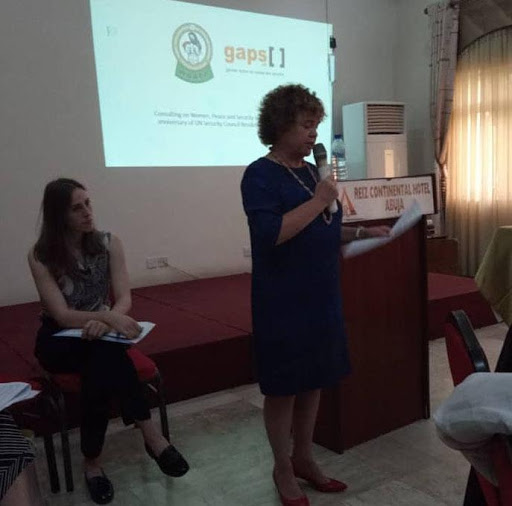
Acknowledging key civil society partners including H.E Toyin Ojora Saraki and the Wellbeing Foundation Africa, the British High Commissioner Catriona Laing stated:
“One of the areas we are working on with the Nigerian Government is the passage of Gender and equal opportunity bill. And we are hopeful it will be passed into law soon, to ensure an extensive legal framework that caters for the security, justice and wellbeing of women and girls across the country. “
The Security Council adopted the resolution on women, peace and security on 31 October 2000. The resolution reaffirms the important role of women in the prevention and resolution of conflicts, peace negotiations, peace-building, peacekeeping, humanitarian response and in post-conflict reconstruction and stresses the importance of their equal participation and full involvement in all efforts for the maintenance and promotion of peace and security. Resolution 1325 urges all actors to increase the participation of women and incorporate gender perspectives in all United Nations peace and security efforts. It also calls on all parties to conflict to take special measures to protect women and girls from gender-based violence, particularly rape and other forms of sexual abuse, in situations of armed conflict.
FROM April 2nd, 2019
Today, Her Excellency Toyin Saraki, Founder-President of the Wellbeing Foundation Africa, was announced as the newest member on Concordia’s Leadership Council. Joining a roster of global influences and leaders, Concordia commented:
“With over two decades in advocating for maternal, newborn, and child health across Africa, Mrs Saraki has dedicated her life to empowering communities through education and gender equality. Founded in 2004 in Nigeria, WBFA strives to improve health outcomes for women, infants, and children across Africa. Through a multi-faceted strategy consisting of research, programmes, policy, education, and advocacy, WBFA—along with its sister organization, Wellbeing for Women Africa—is facilitating tangible, lasting progress towards the attainment of the SDGs, with a particular focus on SDG 3, Good Health and Well-being; SDG 5, Gender Equality; and, SDG 6, Clean Water and Sanitation.”
Concordia welcomed Mrs Saraki as a Speaker at the launch of the 2019 Concordia Africa Initiative in London. In a conversation titled African-Led Philanthropy: Recasting the Aid-Dependent Narrative, Mrs Saraki shared her insight into the ways in which African philanthropists and corporate foundations can advance meaningful innovations to create social impact across the continent. Emphasizing the need to ensure the longevity of philanthropic projects, Mrs Saraki highlighted the critical role of community-level buy-in in cultivating a sense of ownership, responsibility, accountability, and—ultimately—sustainability.
“It was an honor to host Mrs Saraki at our inaugural Africa Initiative, where she demonstrated her unwavering commitment to the youth of Africa and shared her invaluable perspective on the role of innovative philanthropic models across the continent,” remarked Concordia Co-Founders Nicholas Logothetis and Matthew Swift. “It is with great pride that we welcome Mrs Saraki to our esteemed Leadership Council, and know that she will play an integral role in shaping our priorities, approach, and growth as we develop our Africa Initiative at the Annual Summit in New York this September and beyond.”
Upon accepting the invitation, Mrs Saraki commented: “I am honoured to join the Concordia Leadership Council, the leading organisation in fostering, elevating and sustaining cross-sector partnerships for social impact. I look forward to bringing my experience as a global advocate for inclusive health, education and economic strategies focused on improving the wellbeing and livelihoods of women, children and youth to the dialogue; I am hugely encouraged by the prospect of cascading the power and effect of the Council’s vision, mission and strategic leadership into frontline collaborations that transform the lives of my fellow Africans for the better.”
Mrs Saraki joins the Leadership Council alongside being global champion for Universal Health Coverage, Special Advisor to the Independent Advisory Group (IAG) of the World Health Organization’s (WHO) Regional Office for Africa (AFRO), and the inaugural Global Goodwill Ambassador for the International Confederation on Midwives (ICM).
FROM March 26th, 2019
I thank the Government of Cabo Verde and the World Health Organization Regional Office for Africa as they jointly host the 2nd World Health Forum this week. With the theme ‘Achieving Universal Health Coverage and Health Security in Africa: The Africa we want to see’, the 2nd Health Forum builds upon the 1st WHO Africa Health Forum hosted in Kigali, Rwanda in June 2017. The 1st Africa Health Forum had the theme ‘Putting People First: The Road to Universal Health Coverage in Africa’. As the second iteration of the Forum commences, the outcomes of the objectives set out in 2017 are a sign of progress and Africa’s commitment to attain the highest possible level of health for its people as articulated in the WHO Constitution, the African Union Health Strategy 2016 – 2030 and Agenda 2063, and the Transformation Agenda of the WHO African Region.
In this first year since I accepted my appointment as a Special Advisor within the WHO Africa Regional Office’s Independent Advisory Group, I have supported the continued progress of the WHO Africa Regional Office in providing improved access to quality care across the continent. At the 3rd meeting of the Independent Advisory Group (IAG) in Johannesburg, South Africa in March 2018, we focused on repositioning the work of the WHO in Africa in the context of the WHO’s 13th General Programme of Work (GPW13) and the global WHO Transformation Plan. In particular, I welcomed the introduction of WHO AFRO’s focused curriculum for the professional qualification education of Midwives and Nurses in Africa.
When Dr. Tedros Adhanom Ghebreyesus became the first African Director-General of the WHO in 2017, I welcomed his commitment to Universal Health Coverage as representing bold leadership and I looked forward to working closely with him and Dr. Moeti as Regional Director of the WHO Africa Regional Office. On the 6th of March 2019, Dr. Tedros announced the most wide-ranging reforms in the history of the WHO to modernize and strengthen the institution; I was pleased at this clarion affirmation of a gender focus in the internal reforms and the missions of the WHO. That today over 60% of the senior positions at the WHO are held by women is a desirable achievement towards speaking up for women and girls’ right to health.
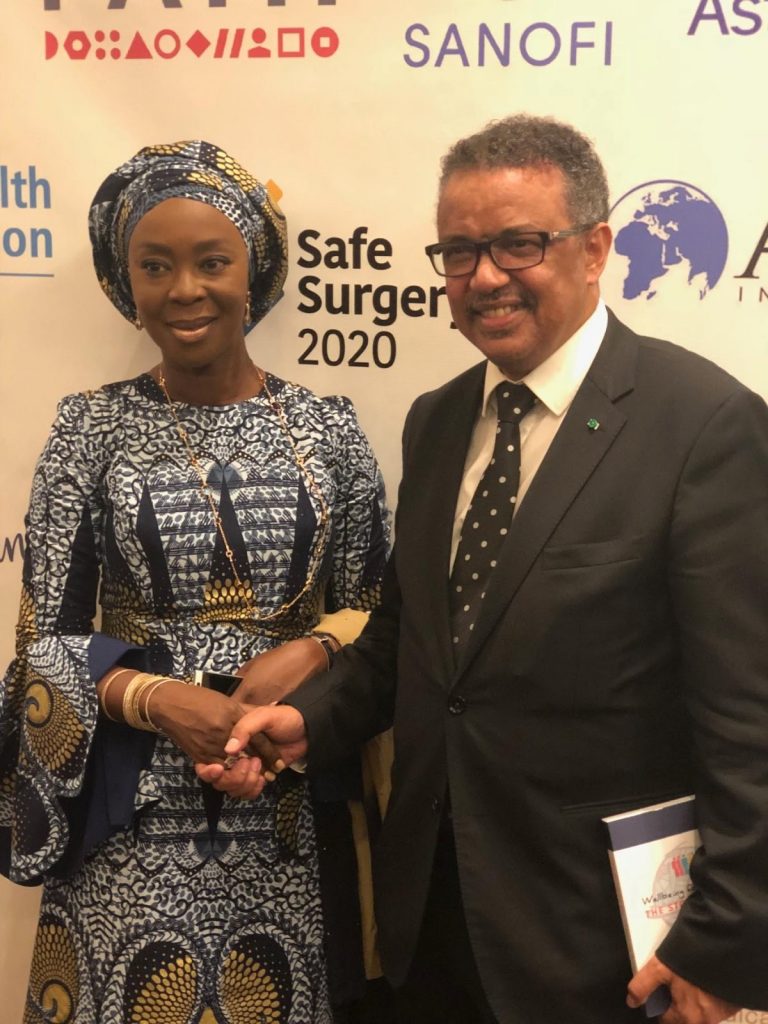
The African continent currently faces a number of complex health challenges. As the Ebola outbreak in the Democratic Republic of the Congo (DRC) approached 1000 cases amid increased violence last week, I commend the reaffirmation by the WHO of its commitment both to ending the outbreak and working with the government and communities to build resilient health systems. At this crucial time for improved healthcare outcomes across the African continent and the effective management of containing disease outbreaks, I am both inspired and humbled by the frontline health workers and 700 WHO staff in DRC who are working hard with partners to listen to the affected communities and address their concerns.
As we observed World Tuberculosis Day earlier this week on Sunday, 24th of March, the efforts of the WHO announced by Dr. Tedros through the FIND. TREAT. ALL joint initiative in partnership with the Stop TB Partnership and The Global Fund to Fight AIDS, Tuberculosis and Malaria highlights the importance of working in partnership to collaborate on enabling access to the care for the millions who miss out on quality TB care each year. As Founder-President of the Wellbeing Foundation Africa, I have experienced how through partnerships we can achieve so much more than what we can achieve alone. Strong partnerships and collaboration have always led to longer term results. Indeed, we go farther, together. I agree with the WHO that it is only by setting standards to strengthen and accelerate joint responses can the world meet the commitments set forth in the WHO End TB Strategy, Stop TB Global Plan to End TB and Sustainable Development Goals.
Today, as the Global Health Community faces new crises spurred by natural disasters, the WHO has been demonstrably effective in the provision of timely resources and solutions. As efforts continue to ramp up the health response in the aftermath of Cyclone Idai, which struck and displaced thousands of people in Southern Africa across Malawi, Mozambique and Zimbabwe, I stand with the WHO and its leadership through its Africa Regional Office and Dr. Moeti in efforts to provide urgent assistance to the region.
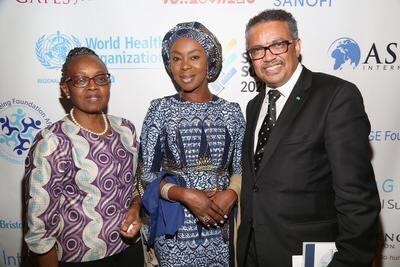
On January 31, 2019, the Executive Board of the World Health Organization endorsed a call for 2020 to be officially recognized as the ‘Year of the Nurse and Midwife’. This announcement is a milestone on the path to giving nurses and midwives, alongside all frontline health workers, the necessary recognition, agency and resources they need to deliver the highest possible healthcare outcomes across the continuum of care. It gladdens my heart and the hearts of midwives and nurses across the world that next year will see the spotlight shine on them, and their historical forebear, Florence Nightingale.
Thank you once again for the invitation to join you this Forum – I wish you the very best in your discussions. Most importantly, I look forward to working further with the WHO and its Africa Regional Office towards Universal Health Coverage across the continent and creating the Africa We Want to See.
FROM March 20th, 2019
At a World Water Day event today in Abuja convened by WaterAid and the Foundation for Partnership Initiatives in the Niger Delta (PIND), Toyin Saraki, Founder-President of the Wellbeing Foundation Africa and Global Goodwill Ambassador to the International Confederation of Midwives (ICM), announced a major expansion of the existing work of her Foundation in the area of water, sanitation and hygiene.
Mrs Saraki launched her Foundation’s campaign to end open defecation in Nigeria in line with the priorities of the World Health Organization, to which Mrs Saraki serves as the Special Adviser to the Independent Advisory Group of the Africa Regional Office, and the World Bank, with which the Wellbeing Foundation has worked closely on water, sanitation and hygiene since last year.
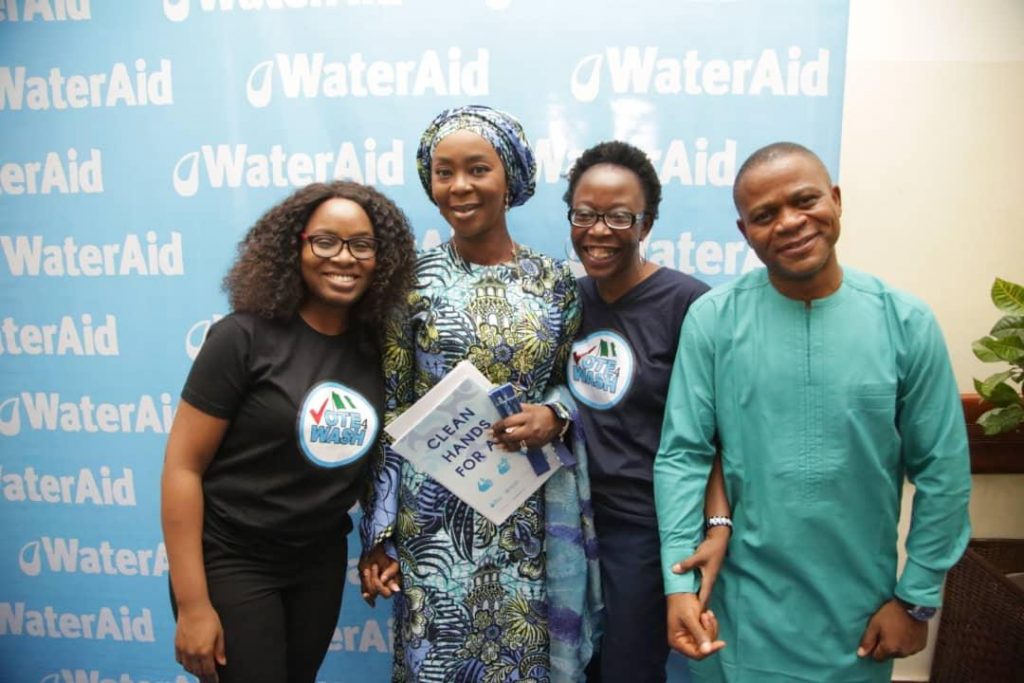
At the World Water Day event Mrs Saraki commented:
“I commend the progress made by programmes such as the USAID four-year 60-million-dollar investment in Effective Water, Sanitation and Hygiene activity (E-WASH) in six states in Nigeria and the work of DFID in Bauchi State.”
“Thank you to WaterAid Nigeria Country Director Dr Chichi Aniagolu-Okoye and PIND Deputy Executive Director Tunji Idowu for their work to improve water, sanitation and hygiene – often known as ‘WASH’ – indices in Nigeria and for their comments today.”
“I am delighted to announce today that the Wellbeing Foundation will extend its WASH campaign to include not only WASH in schools and hygiene in healthcare facilities, but also ‘a toilet for all’ to end open defecation in Nigeria.”
“Nigeria has the second highest rate of open defecation in the world. This increases the risk of the spread of infectious diarrhoeal disease such as cholera. In addition to campaigning for improved access to clean and safe toilet facilities, the Wellbeing Foundation will work to improve the general understanding of the dangers of open defecation.”
“At the Wellbeing Foundation Africa, we launched a water, sanitation and hygiene campaign in May 2018, at the World Health Organization offices here in Abuja. We did so because of the overwhelming evidence coming back to us from our frontline healthcare programmes that we had to retrace our steps – that WASH indices in Nigeria were not only poor; but were worsening in many instances.”
“In September 2018 the WBFA partnered with Unilever Lifebuoy Nigeria and Sightsavers to improve hygiene practices to impact more than 2 million children over the following 12 months. The partnership works on programmes which promote hygiene messages and prevent disease, advancing critical hygiene interventions such as handwashing with soap, addressing the issue of child illnesses and mortality due to preventable diseases.”
“WASH indices are often, rightly, discussed as statistical values. That is of course crucial to any national plan, and the WBFA staunchly advocates for improved civil registration and vital statistics systems. We know that one out of three Nigerians does not have clean water close to home and two in three do not have a decent household toilet. This contributes to the deaths of nearly 60,000 children under five each year of diarrhoeal illnesses caused by dirty water, poor sanitation and poor hygiene. Poor WASH conditions kill more people annually in Nigeria than have died in conflict with Boko Haram. According to WaterAid, it also means a loss of 0.9% of our GDP, around $3.38 billion USD a year.”
“As Special Adviser to the WHO Africa Regional Office, I also strongly advocate for the WHO Sepsis Resolution to be adopted and implemented by all governments. In October 2018 the WHO introduced new and pioneering guidelines for WASH in conjunction with neglected tropical diseases. These must be acted upon as a matter of urgency.”
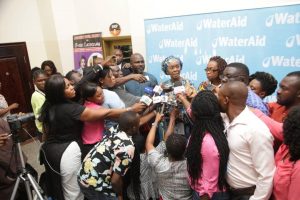
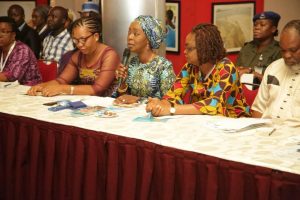
Representatives from the UK Department for International Development, the European Union, USAID, UNESCO, Unilever, Coca-Cola and several other stakeholders took part in the event to mark World Water Day.
FROM March 6th, 2019
Mrs Toyin Ojora Saraki today addressed the Africa Health Conference in Kigali, Rwanda, as part of a panel organised by PATH in collaboration with AMREF Health Africa.
Mrs Saraki joined Dr. Sarah Opendi, Uganda Minister for Health, Professor Joachim Osur, Director, Regional Programs and Field Offices, AMREF, and Angela Nguku of White Ribbon Alliance, Kenya, in a high-level session focused on ‘Social Accountability to Advance Universal Health Coverage.’
Having been named by Devex as a ‘Global Health for All Champion’ in 2018, Mrs Saraki – who is the Founder-President of the Wellbeing Foundation Africa – outlined her vision of universal health coverage, stating:

“One of the key downfalls of outdated, top to bottom, external agency models of health – often coming from a ‘traditional aid’ perspective – is that citizens are viewed as passive beneficiaries. That modus operandi will not help us to achieve universal health coverage. The active participation of the communities that health systems are designed to serve is an absolute necessity, including in design and modification.”
“Trust is the currency of advocacy – but it will be eroded if the service delivery that citizens have been told they need and deserve is not available”
“A well-designed civil registration & vital statistics system is essential. Only with the collection and dissemination of accurate data can we ensure effective delivery, evaluation and monitoring of sustainable, effective public health strategies.”
“The Wellbeing Foundation Africa has as its founding centrifuge a core civil registration and vital statistics tool, the Personal Health Record, which empowers women to be the key agent in social accountability and community audit in ensuring health for all.”
“We must match the intelligence and knowledge of communities with global innovation. Too often national or global policy decisions simply do make it effectively to the frontline”
“We are all the duty bearers and decision-makers. We have to remove silos when it comes to community accountability.”
The Wellbeing Foundation Africa is the proud Nigerian partner to AMREF on the ground-breaking report ‘Cancer Ecosystem Assessment in West Africa: Health Systems Gaps to Prevent and Control Cancers in three countries: Ghana, Nigeria and Senegal.
FROM February 28th, 2019
Toyin Saraki, Founder-President of the Wellbeing Foundation Africa, today addressed the inaugural Concordia Africa Initiative, founded by Nicholas Logothetis, with global leaders including Cherie Blair, H.E Olusegun Obasanjo, Former President, Federal Republic of Nigeria; H.E. Liu Xiaoming, the Ambassador of the People’s Republic of China to the United Kingdom, and Madame Monica Geingos, First Lady of the Republic of Namibia.
Mrs. Saraki challenged those convened at Concordia to approach a new paradigm for aid as co-investment as opposed to the donor-beneficiary narrative.
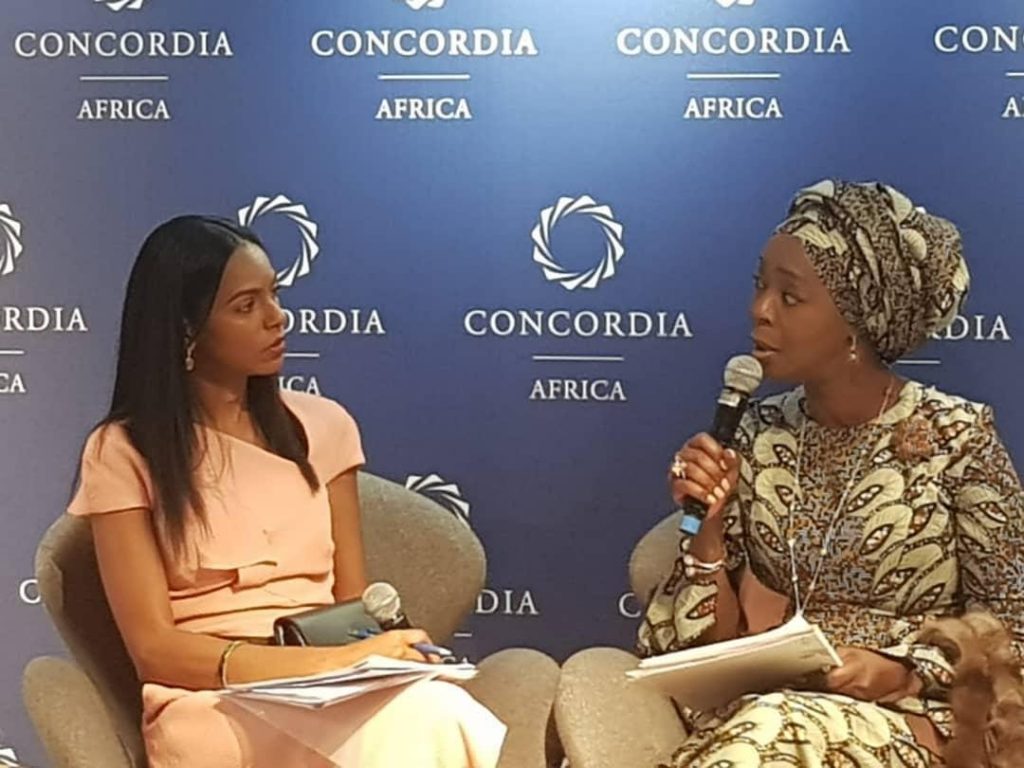
In her speech, Mrs Saraki called for overseas investors to work with African and community-led partners to achieve sustainable successes and impact:
“We must approach our challenges from a position of honesty and move away for the ‘aid narrative.’ Co-investment from communities is necessary for sustainable impact – if only from the perspective of human resources.”
“There are inherent strengths which make African-led philanthropy particularly effective. I identify these primarily as the fact that our work is community-led and therefore both more effective and sustainable; and the flexibility which comes from embedded networks leading to the ability to influence policy decisions at a national, regional and global level with data-driven advocacy.”
“We have the brainpower and excellence in Nigeria and throughout Africa to bring our health indices up to global standards. To build capacity we must in part look to strategic partnerships to help us deliver results to the frontline.”
“African-led foundations are able to work with our own communities – not by foisting an external model on them, but by working with them to identify key issues, build up their own champions, and allocate resources, where needed, efficiently and with the buy-in of those who will act as service providers and as service users.”
“We cannot accept lower expectations or the notion that aid is any form of the long-term solution. It is not: we should aim for a global standard in all that we do. It has been shown time and time again that we have the capability to achieve on a global level as a nation and as a region once we have the necessary tools, training, and infrastructure to do so. Addressing those gaps is part of our challenge in achieving excellence and I believe that partnerships on an equal footing – not aid – are one of the tools we can use to do so.”
The Concordia Africa Initiative is intended to provide a platform for cross-sector leaders to share strategies and priorities for African economic growth, to promote innovative cross-sector and public-private partnerships in Africa, and to build connections and identify opportunities to create lasting prosperity on a rapidly-changing and demographically-growing continent. The initiative will be shaped and driven by local stakeholders in order to build sustainable and scalable alliances among the government, private sector, and civil society.